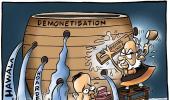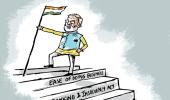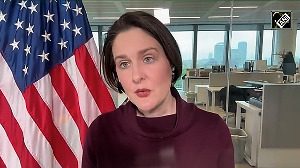'Till now, we were under tremendous stress. The economy was not recovering, the financial cycle was not moving and the banks were not supporting.'
'With the government pumping in money to the banks and asking the NBFCs to give priority to the MSME sector, there will be a revival.'

Among the measures Finance Minister Nirmala Sitharaman announced over the last month to revive economic growth and restore investor confidence, are ones targeted at medium, small and micro enterprises, or MSMEs.
Doubling the limit for exemption from payment of GST from Rs 20 lakh to Rs 40 lakh, pending GST refunds to be paid in 30 days while fresh refunds will be paid in 60 days, not declaring the sector's NPAs till March next year, making MSMEs the focus of loan 'melas' are some of the measures announced to revive the fortunes of a sector that hires 120 million workers, the second largest after agriculture.
Will these measures work?
"You must understand that the MSME sector acts like a ladder in the economy. Only when we manufacture, the larger industries can assemble products," R Ramamurthy -- president, CODISSIA (Coimbatore District Small Industries Association) who had met the finance minister on behalf of the body's 2,000 members -- tells Rediff.com's Shobha Warrier.
Many people say the MSME sector still has not recovered from the impact of demonetisation and GST.
Demonetisation did not cause much trouble to the sector as it impacted only money circulation or cash flow. In those days, we only had problem paying the weekly and monthly wages. We were paying cash to most of the employees as not many had bank accounts. Slowly, we enrolled more and more employees into the digital economy which was a good move.
Demonetisation resulted only in a cash flow problem and the economy was not affected.
Now comes the GST. Though CODISSIA welcomes GST, there is a problem with it and that is regarding the form.
You mean it is very complicated for people to understand.
Yes. Before going into the problem, let me talk about the positives of GST.
There is an ease in logistics now. We are saving 50% of the time taken in transportation as there is only one tax throughout India.
But the design of the GST format is so complicated that the micro and small industries are not able to understand it.
In the days of VAT and excise, the forms were so simple that any person with a training of 4 to 6 weeks, was able to do it. But the GST forms are so difficult to understand that only professionals can do it.
The end result is an increase in the cost as you need professionals to fill in the form for you. The micro and small industries are not able to bear the increase in the cost.
What we want is a simple annual return form for GST which any layman would understand. Also, they should make one tax structure of 12%. I am sure consumption will improve a lot then because prices will come down.
Will the government's decision to raise the ceiling of GST exemption from Rs 20 lakhs to Rs 40 lakhs help the sector?
This will definitely help many in the micro and small industries who were hit by GST. They need not register under GST now.
CODISSIA had requested the government to raise the ceiling to Rs 1 crore considering today's cost of production.
The difference in the price of branded goods and the products made by the micro and small industries has come down drastically after the introduction of GST.
You take, for example, an electric motor. A large company and also a small company in Coimbatore make the same motor. Because the margin of difference is only 15% to 20%, many people prefer buying branded goods.
You mean the prices of non-branded products made by a micro and small industries have gone up after the introduction of GST?
I will say the difference in the margin of branded and non-branded products has come down.
The reason is, during the excise duty period, micro and small industries enjoyed an excise exemption of Rs 1.5 crore. But the exemption limit for GST was Rs 20 lakh which the government raised to Rs 40 lakh now.
That's why CODISSIA is asking for an exemption limit of Rs 1 crore which is mainly to survive the competition.
In the third booster given by the finance minister, the GST on many items are reduced. Would you say it would help the MSME sector?
I had met the finance minister representing the MSME sector to present our views which I did in front of 16 captains of the industry.
Our major request was, in these times of economic slowdown, to change the NPL (non-performing loan) time limit from 90 to 180 days.
The finance minister listened very patiently and the relief given by the minister to the MSME sector is very welcoming. This is the first time that such a relief measure is being taken by a finance minister.
In these days of economic slowdown, all the micro and small entrepreneurs were under tremendous pressure on the 91st day. Now, we have got a breather time of six months.
It was a demand from the CODISSIA and the minister said, 'Banks do not have to declare any stressed MSME as Non-Performing Asset until 31.03.2020.'
This is a big relief for us. You cannot work under the pressure that you have to repay the loan, but have no orders.
This is the situation under which the micro and small industries work and nobody else understands this.
When you get a breather time of six months, you can try for newer opportunities, newer orders and rotate the money to repay the loan.

You mean this decision will help the revival of the MSME sector?
Yes. We foresee a turnaround in the economy in the next three months because of the measures taken by the government.
Now, those in stress in the MSME sector can look for new opportunities in the next six months.
Till now, we were under tremendous stress. The economy was not recovering, the financial cycle was not moving and the banks were not supporting.
With the government pumping in money to the banks and asking the NBFCs to give priority to the MSME sector, there will be a revival.
You must understand that the MSME sector acts like a ladder in the economy. Only when we manufacture, the larger industries can assemble products.
MSMEs are the largest buyers of raw materials and we manufacture products with the raw materials and then supply to large scale industries.
You said there could be an economic revival in three months. What is the reason for the optimism?
The tax relief given to the corporate sector gives us the hope. Only when they perform well, they will give orders to the MSME sector. That is the supply chain: Large, medium and small, and when the large ones do not perform, it affects us.
Another thing that has to change is the buyer's sentiment.
People are not spending as they do not have purchasing power now. Are you hoping for the spending cycle to start?
That's why we are waiting for a fourth booster which will help consumers have more money in their hands.
Another change that has to happen is in the RBI policy. The ratio banks follow while giving a loan is, whether you are a large or a medium or a small company, only 20% of our working capital. They have been following this ratio for many years.
We at CODISSIA are asking for a change in the rules at least now. They cannot have the same rules for large scale industries and small-scale industries. It is not justifiable.
The banks have to change the mindset. And we at MSME sector depend solely on banks or NBFCs for loans.
After the GST, there is a shortage of working capital in the MSME sector. That's why we want a loan of 40% of the working capital.
They say if the manufacturing sector has to perform well, the MSMEs have to...
Exactly. The MSME sector is the largest employment provider, 10 times more than large-scale industry, giving employment to 12 crore (120 million) people.
MSMEs are a labour-intensive industry. When we have a large population, only MSMEs can provide employment to our people.
We are also the largest buyers of raw materials.
That's why we request the RBI to change the ratio in giving loans. Also, declaring a company as NPA on the 91st day is a disaster.
Once you are declared an NPA, you will not get a single paisa loan from anywhere.
Is this justifiable in a country like India? That's why we asked for a period of 180 days.
The finance minister was kind enough to change it, but only as a temporary measure. Our request to the RBI is to change these measures permanently.
It is said that there is a slowdown globally...
I am not bothered about the global slowdown as I feel the Indian economy can sustain itself.
We are strong enough to sustain at least in the basic requirement. Even during a global recession, the MSMEs can sustain ourselves or survive because of our consumption power.
Yes, if you want to grow, you should look for exports. But again, we are not competitive at all in the global market when we compare ourselves with China. We have to skill ourselves more and improve the quality of our products.
Now that the festival season has started, do you expect confidence in the minds of consumers to spend?
That's what the government is trying to do. Like cutting the corporate tax, they have to do something to boost consumer sentiments and improve consumption.











 © 2025
© 2025